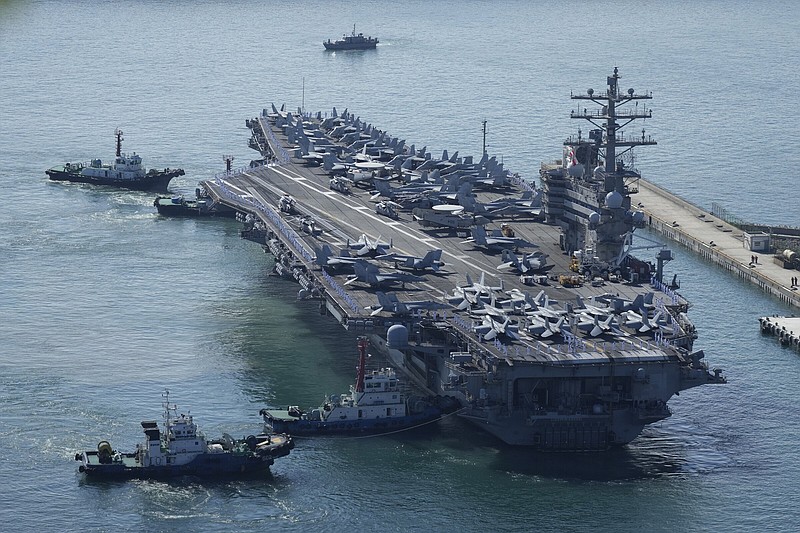BUSAN, South Korea -- The nuclear-powered aircraft carrier USS Ronald Reagan arrived Friday in the South Korean port of Busan ahead of the two countries' joint military exercise that aims to show their strength against growing North Korean threats.
The joint drills will be the first involving a U.S. aircraft carrier in the region since 2017.
The allies this year have revived their large-scale military drills that were downsized or shelved in previous years to support diplomacy with Pyongyang or because of covid-19, responding to North Korea's resumption of major weapons testing and increasing threats of nuclear conflicts with Seoul and Washington.
The South Korean navy said the training is meant to boost the allies' military readiness and show "the firm resolve by the Korea-U.S. alliance for the sake of peace and stability on the Korean Peninsula."
"The commitment of the U.S. carrier strike group operating in and around the peninsula illustrates our commitment to stand together and our desire and focus ensuring that we are interoperable and integrated to face any challenge or threat whenever we are required," Rear Adm. Michael Donnelly, commander of the carrier strike group, said in a news conference.
The North Korean threat is also expected to be a key agenda when Vice President Kamala Harris visits South Korea next week after attending the state funeral in Tokyo of slain former Japanese Prime Minister Shinzo Abe.
The Reagan's arrival in South Korea comes after North Korean leader Kim Jong Un told Pyongyang's rubber-stamp parliament this month that he would never abandon his nuclear weapons.
North Korea also passed a new law that authorized the preemptive use of nuclear weapons when the country or its leadership comes under threat.
Sung Kim, the Biden administration's special representative for North Korea, met Thursday with South Korean counterpart Kim Gunn in Seoul, where they expressed "serious concern" over the North's escalating nuclear doctrine spelled out in the new law, South Korea's Foreign Ministry said.
North Korea has dialed up weapons testing to a record pace in 2022, launching more than 30 ballistic weapons including its intercontinental ballistic missiles since 2017, as it exploits a divide in the U.N. Security Council deepened over Russia's war on Ukraine.
While North Korea's ICBMs garner much of U.S. attention because they pose a potential threat to the homeland, the North has also been expanding its arsenal of nuclear-capable, shorter-range missiles designed to evade missile defenses in South Korea.
North Korea's expanding arsenal and threats of preemptive nuclear attacks have triggered concerns in South Korea over the credibility of the U.S. "nuclear umbrella" protecting its allies in the event of war.
South Korean President Yoon Suk Yeol, a conservative who took office in May, has vowed to enhance South Korea's conventional missile capabilities and work with the Biden administration to develop more effective strategies to deter North Korean attacks.
North Korea has so far rejected U.S. and South Korean calls to return to nuclear diplomacy, which have been stalled since 2019 over disagreements in exchanging the release of U.S.-led sanctions against the North and the North's disarmament steps.
Information for this article was contributed by Yong Jun Chang of The Associated Press.
